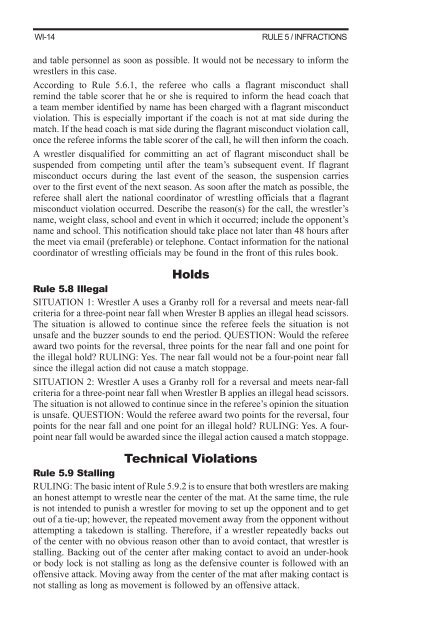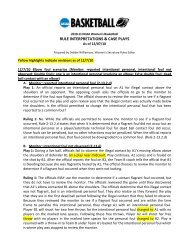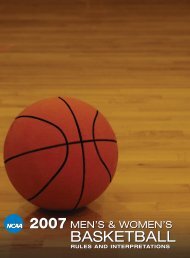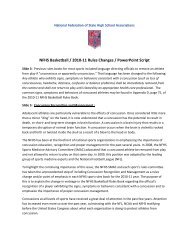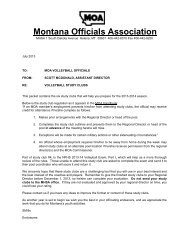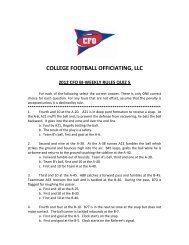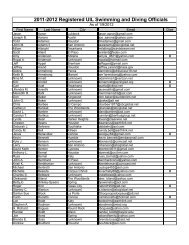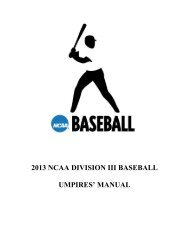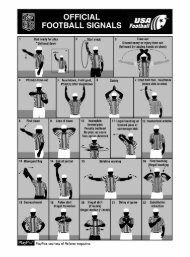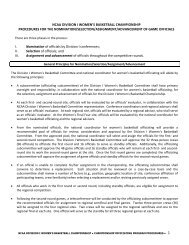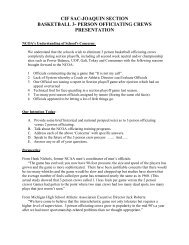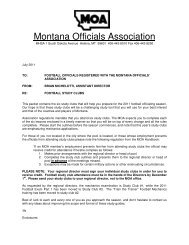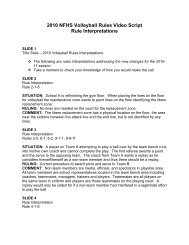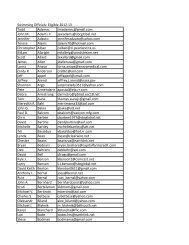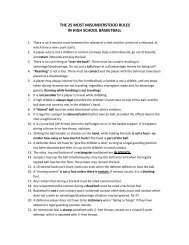(PDF). - NCAA Wrestling Officiating
(PDF). - NCAA Wrestling Officiating
(PDF). - NCAA Wrestling Officiating
Create successful ePaper yourself
Turn your PDF publications into a flip-book with our unique Google optimized e-Paper software.
WI-14<br />
RULE 5 / INFRACTIONS<br />
and table personnel as soon as possible. It would not be necessary to inform the<br />
wrestlers in this case.<br />
According to Rule 5.6.1, the referee who calls a flagrant misconduct shall<br />
remind the table scorer that he or she is required to inform the head coach that<br />
a team member identified by name has been charged with a flagrant misconduct<br />
violation. This is especially important if the coach is not at mat side during the<br />
match. If the head coach is mat side during the flagrant misconduct violation call,<br />
once the referee informs the table scorer of the call, he will then inform the coach.<br />
A wrestler disqualified for committing an act of flagrant misconduct shall be<br />
suspended from competing until after the team’s subsequent event. If flagrant<br />
misconduct occurs during the last event of the season, the suspension carries<br />
over to the first event of the next season. As soon after the match as possible, the<br />
referee shall alert the national coordinator of wrestling officials that a flagrant<br />
misconduct violation occurred. Describe the reason(s) for the call, the wrestler’s<br />
name, weight class, school and event in which it occurred; include the opponent’s<br />
name and school. This notification should take place not later than 48 hours after<br />
the meet via email (preferable) or telephone. Contact information for the national<br />
coordinator of wrestling officials may be found in the front of this rules book.<br />
Holds<br />
Rule 5.8 Illegal<br />
SITUATION 1: Wrestler A uses a Granby roll for a reversal and meets near-fall<br />
criteria for a three-point near fall when Wrester B applies an illegal head scissors.<br />
The situation is allowed to continue since the referee feels the situation is not<br />
unsafe and the buzzer sounds to end the period. QUESTION: Would the referee<br />
award two points for the reversal, three points for the near fall and one point for<br />
the illegal hold? RULING: Yes. The near fall would not be a four-point near fall<br />
since the illegal action did not cause a match stoppage.<br />
SITUATION 2: Wrestler A uses a Granby roll for a reversal and meets near-fall<br />
criteria for a three-point near fall when Wrestler B applies an illegal head scissors.<br />
The situation is not allowed to continue since in the referee’s opinion the situation<br />
is unsafe. QUESTION: Would the referee award two points for the reversal, four<br />
points for the near fall and one point for an illegal hold? RULING: Yes. A fourpoint<br />
near fall would be awarded since the illegal action caused a match stoppage.<br />
Technical Violations<br />
Rule 5.9 Stalling<br />
RULING: The basic intent of Rule 5.9.2 is to ensure that both wrestlers are making<br />
an honest attempt to wrestle near the center of the mat. At the same time, the rule<br />
is not intended to punish a wrestler for moving to set up the opponent and to get<br />
out of a tie-up; however, the repeated movement away from the opponent without<br />
attempting a takedown is stalling. Therefore, if a wrestler repeatedly backs out<br />
of the center with no obvious reason other than to avoid contact, that wrestler is<br />
stalling. Backing out of the center after making contact to avoid an under-hook<br />
or body lock is not stalling as long as the defensive counter is followed with an<br />
offensive attack. Moving away from the center of the mat after making contact is<br />
not stalling as long as movement is followed by an offensive attack.


